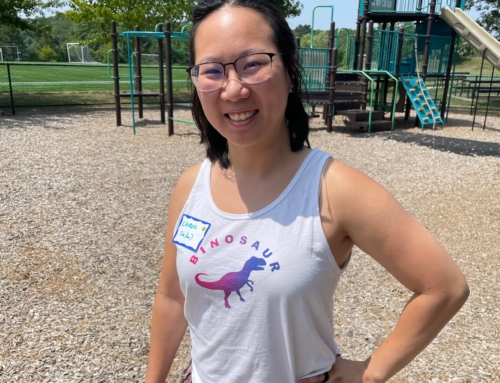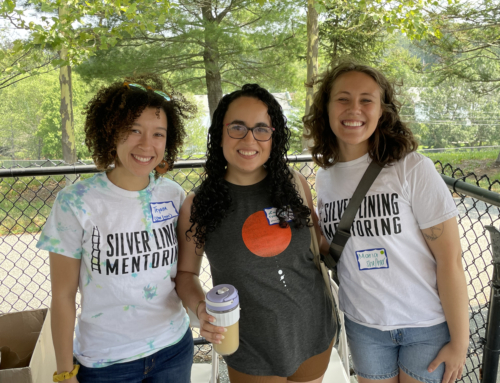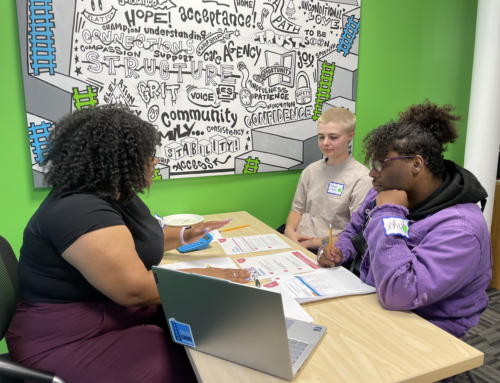The F-Word
At our Match Gala this May, Silver Lining Mentoring’s CEO, Colby Swettberg, got on stage and talked to our over 250 guests about “the f-word.” As the Director of Development and the person overseeing the event, I had a small heart attack. Luckily I recovered in time to hear Colby clarify, the f-word was “family.”
Family, in many ways, underlies our work and our culture here at SLM. For our young people in foster care, we strive to support the variety of ways they define family, which often includes our volunteer mentors. At the office, we think of our departments and projects the way one might think of a family. We work along our individual strong suits to support each other and each other’s work. Together, we all seek the common goal of empowering young people in foster care throughout Greater Boston, ensuring they have what they need, when they need it for as long as they need it. We know that reaching our goals requires a team effort—a family effort.
There’s no part of our SLM family that isn’t working to forward our mission on a daily basis. Our volunteer team ensures we have the mentors and other outside resources we need to support each young person on a one-to-one basis. Our admin team makes sure our office and employment needs are in order, so that each team member can bring his or her expertise to bear in service of out mentor/mentee matches. Our clinical program team works with our youth and mentors every day to ensure they have what they need to thrive. Over the years, we have moved our average match length up from 26 months to 55 months, an increase of over 100%, and a stark contrast to the national average of nine months.
Our team—the fundraising team—supports SLM’s work through the use of another f-word: fundraising. It’s our team’s goal to ensure SLM can support our youths’ evolving needs Sometimes at non-profit organizations, we think of fundraising as a “necessary evil” for getting the job done. While fundraising is necessary to the successful function of a growing non-profit, it isn’t “evil.”
By working to increase revenue at SLM, we’re bolstering the resources and programming that we can offer to the young people whom we’re privileged to serve. At organizations like ours, “resources in” means “programming out.” When our organization comes together to annually re-assess our program and strategize for the following year, we think about our plans along three lines: a) what youth are telling us about what they want or need; b) what makes sense for our growth over time strategically; and c) what our resources will allow us to accomplish. Our fundraising team works daily to support this incredible growth.
Plus, fundraising is fun! Every day, our team gets to do amazing work. We get to go out and tell the stories of our remarkable, resilient youth and our incredible, dedicated mentors. We get to educate constituents about young peoples’ experiences in care, as we educate ourselves. When I started here 10 months ago, I knew almost nothing of this system. Each day is a new learning opportunity for me. In fact, one of my favorite stories to tell highlights how much I’ve had to learn.
A mentor, Karen*, had spent a wonderful Sunday with her mentee, Lana*, as they did twice monthly. At the end of their time together, Lana wasn’t ready to go, and asked to tag along for whatever other plans Karen had that day. Karen’s only other engagement was with some errands. She needed to go to the grocery store, and she was sure Lana wasn’t interested in something so mundane. However, she was surprised to discover that Lana was thrilled to go with her. Even as a teenager, Lana had never done her own grocery shopping. With Karen’s support, she was eager to learn this essential life skill. After that request, Karen and Lana often went to the grocery store together, teaching and learning about food shopping, budgeting, cooking, and nutrition.
As I’ve learned, Lana lived in group homes and residential facilities, an experience shared by the majority of our youth. This was in contrast to what I had assumed, which was that most young people in foster care are in foster homes. Instead, many of our youth are experiencing childhood in facilities which may meet their clinical needs, but sometimes fall short of some of their emotional needs. That’s where our mentors step in, to provide the consistent caring and support that our young people are looking for. I love to tell this story of support, connection, and learning because, in addition to education, it’s truly a story of family. Sharing this story and this kind of learning is a unique experience for our fundraising team, and we’re so fortunate to have that opportunity.
This holiday season, we may be thinking all kinds of f-words. But in reality, the word that is on my mind the most this season begins with T: thankfulness. Thank you so much for your support of our young people in care, and of our volunteer mentors. Thank you for sustaining and working alongside SLM as we strive to serve this population in the most effective way possible. And, thank you for the opportunity to engage in this vital, difficult and deeply fulfilling work. Our mentees and mentors are able to be connected and supported due to your support, and for that, we’re really f’ing grateful.
Wishing you a very happy new year from all of us at Silver Lining Mentoring!
* Names have been altered






